- Home
- John le Carré
The Night Manager Page 6
The Night Manager Read online
Page 6
“You was friends with thisser woman?” the inspector asks. A cigarette hangs from his lips.
Does he know about Luxor?
Does Hamid?
The best lies are told face-to-face, with a touch of arrogance: “She liked to make use of the hotel,” Jonathan replies, still fighting for a natural tone. “Who did this? What happened?”
The inspector shrugs a prolonged, disinterested shrug. Freddie is not normally troubled by the Egyptian authorities. He bribes them, and they keep their distance.
“You was having sex with thisser woman?” the inspector asks.
Did they see us board the plane?
Follow us to the Chicago House?
Bug the flat?
Jonathan has found his calm. He can do that. The more terrible the occasion, the more certainly can his calm be relied upon. He affects a certain irritation: “If you call the odd cup of coffee sex. She had a bodyguard. He was employed by Mr. Hamid. Where is he? Has he disappeared? Perhaps the bodyguard did it.”
The inspector appears unimpressed. “Hamid? What is Hamid, please?”
“Freddie Hamid. The youngest of the Mr. Hamids.
The inspector frowns as if the name is not agreeable to him, or not relevant, or not known. Of his two assistants, one is bald, the other ginger-haired. They wear jeans and bomber jackets and a lot of facial hair. Both are listening intently.
“What you talk with thisser woman? You are political with her?”
“Small talk.”
“Small?”
“Restaurants. Social gossip. Fashion. Mr. Hamid sometimes took her to the yacht club, here or in Alexandria. We’d smile at each other. Wave good morning.”
“You killer this woman?”
Yes, he replies in his mind. Not in quite the way you think, but yes, I definitely killed her.
“No,” he says.
The inspector hitches his black belt with both his thumbs at once. His trousers are also black, his buttons and insignia gold. He loves his uniform very much. An acolyte is addressing him, but the inspector pays him no attention.
“She ever tell you that someone wish to killer her?” the inspector asks Jonathan.
“Of course not.”
“Why, please?”
“If she had done I would have reported it to you.”
“Okay. You go now.”
“Have you contacted Mr. Hamid? What are you going to do?”
The inspector touches the peak of his black cap in order to give authority to his theory. “Was burglar. Crazy burglar killer woman. Maybe drug.”
Bleary-eyed medics in green overalls and sneakers are arriving with a stretcher and a body bag. Their leader wears dark glasses. The inspector grinds the stub of his cigarette into the carpet and lights another. A camera is flashing, operated by a man in rubber gloves. Everyone has raided the properties chest in order to wear something different. Lifting her onto the stretcher, they turn her over, and one white breast, much diminished, slips free of its torn covering. Jonathan notices her face. It has been almost obliterated, perhaps by kicks, perhaps by a pistol butt.
“She had a dog,” he says. “A Pekingese.”
But even as he speaks he spots it through the open doorway to the kitchen. It lies on the tiles, straighter than it has ever lain before. A gash like a zipper runs along its underbelly from its throat to its back legs. Two men, Jonathan thinks dully: one to hold, one to cut; one to hold, one to beat.
“She was a British subject,” Jonathan says, using the past tense to punish himself. “You’d better call the embassy.”
But the inspector is no longer listening. The bald assistant takes Jonathan by the arm and starts to lead him to the door. For a moment—but it is long enough—Jonathan feels the heat of combat race across his shoulders, down his arms and into his hands. The assistant feels it also and steps back as if he has received a shock. Then he smiles dangerously in kinship. As he does so, Jonathan feels the panic taking hold of him. Not of fear, but of permanent and inconsolable loss. I loved you. And never even admitted it, to you or to myself.
Frau Merthan was dozing beside her switchboard. Sometimes very late she rang her girlfriend and whispered dirty to her, but not tonight. Six incoming faxes for the Tower Suite lay waiting for the morning, together with the originals of last night’s outgoing. Jonathan eyed but did not touch them. He was listening to Frau Merthan’s breathing. He passed his hand tentatively across her closed eyes. She let out a piggish snore. Like a skilled child stealing from his mother’s shopping bag, he coaxed the faxes from their trays. Will the copier still be warm? Has the lift returned empty from the top floor? You killed her? He touched a key on Frau Merthan’s computer, then another, then a third. You are adept. The computer peeped, and he had another disconcerting vision of Roper’s woman descending the Tower Suite stairs. Who were the Brussels boys? Who was Appetites from Miami? Who was Soldier Boris? Frau Merthan turned her head and growled. He began writing down the telephone numbers while she went on snoring.
Ex-junior leader Jonathan Pine, a sergeant’s son trained to fight in all weathers, crunched down the snowy footpath beside a hillside stream as it bubbled and tumbled through the woods. He was wearing an anorak over his dinner jacket and a pair of light climbing boots over his midnight-blue socks. His patent-leather evening shoes dangled in a plastic bag at his left side. All round him in trees and gardens and along the bank the snow’s tracery sparkled under a perfect blue sky. But Jonathan for once was indifferent to such beauty. He was heading toward his staff apartment in the Klosbachstrasse, and the time was eight-twenty in the morning. I shall eat a serious breakfast, he decided: boiled eggs, toast, coffee. Sometimes it was a pleasure to serve oneself. Perhaps a bath first to restore him. And over breakfast, if he could get himself onto a single track, he would decide. He slipped a hand inside his anorak. The envelope was still in place. Where am I going? A fool is someone who does not learn by experience. Why do I feel battle-bright?
Approaching the house that contained his apartment, Jonathan discovered that his step had settled to a marching rhythm. Far from relenting, it conveyed him instead to the Römerhof, where a tram waited for him with its doors ominously open. He rode in it without any opinion as to his behavior, the alien brown envelope stabbing at his chest. Alighting at the main railway station, he allowed himself with the same passivity to proceed once more on foot as far as an austere building in the Bleicherweg, where a number of countries, among them his own, maintained consular and commercial representatives.
“I’d like to speak to Wing Commander Quayle, please,” Jonathan said to the big-jawed Englishwoman behind the bullet-proof window. He extracted his envelope and slid it under the glass. “It’s a private matter. Perhaps you’ll tell him I’m a friend of Mark Ogilvey from Cairo. We sailed together.”
Was the affair of Herr Meister’s wine cellar partly responsible for Jonathan’s decision to vote with his feet? A short while before Roper’s arrival, Jonathan had been incarcerated in it for sixteen hours, and he recalled the experience as an introductory course in death.
Among the extra duties entrusted to Jonathan by Herr Meister was the preparation of the monthly inventory of the fine-wine cellar, which lay deep in the blue rock underneath the oldest part of the hotel. Jonathan customarily undertook this task on the first Monday of each month, before beginning the six-day break to which he was by contract entitled in lieu of weekends. On the Monday in question, his routine did not vary.
The insurance value of the fine wines had recently been set at six and a half million Swiss francs. The cellar’s security devices were of a commensurate complexity. One combination and two inertia locks had to be released before a fourth, a spring lock, would yield. A baleful video camera eyed each suitor as he approached. Having successfully negotiated the locks, Jonathan embarked upon his ritual count, beginning as usual with the 1961 Château Pétrus, offered this year at four thousand five hundred francs a bottle, and graduating to the ten-thousand-franc ma
gnums of 1945 Mouton Rothschild. He was in the middle of his calculations when the lights went out.
Now Jonathan loathed the dark. Why else does a man elect to work at night? As a boy he had read Edgar Allan Poe and shared every hell endured by the victim of “The Cask of Amontillado.” No mining disaster, no collapsed tunnel or story of alpinists trapped in a crevasse, but had its separate gravestone in his memory.
He stood motionless, deprived of orientation. Was he upside down? Had he had a stroke? Had he been blown up? The mountaineer in him braced himself for impact. The blinded sailor clung to the wreckage. The trained combatant edged toward his invisible adversary without the comfort of a weapon. Wading like a deep-sea diver, Jonathan began feeling his way along the wine racks, in search of a light switch. Telephone, he thought. Did the cellar have a telephone? His habit of observation was a hindrance to him. It was retrieving too many images. The door: had the door a handle on the inside? By brute mental force he managed to recall a buzzer. But the buzzer needed electricity.
He lost his hold upon the cellar’s geography and began circling the racks like a fly inside a black lampshade. Nothing in his training had equipped him for anything as awful as this. No endurance marches, hand-to-hand-combat courses or deprival exercises were of the least avail. He remembered reading that goldfish had such short memories that each circuit of the bowl was a brand-new thrill for them. He was sweating, he was probably weeping. He yelled several times: Help me! It’s Pine! The name tinkled to nothing. The bottles! he thought. The bottles will save me! He contemplated hurling them into the darkness as a means of rousing help. But even in his dementia his self-discipline won the day, and he could not muster the irresponsibility to smash bottle after bottle of Château Pétrus at four and a half thousand a go.
Who would notice he was missing? So far as the staff knew, he had left the hotel for his monthly six days off. The inventory belonged technically to his free time, a bad bargain wheedled out of him by Herr Meister. His landlady would assume he had decided to sleep at the hotel, a thing he did occasionally when there were spare rooms. If no chance-millionaire came to his aid by ordering a bottle of fine wine, he would be dead before anyone noticed his absence. And millionaires were grounded by the impending war.
Willing himself into a calmer state, Jonathan sat to attention on what felt like a cardboard crate and strove with all his might to make order of his life till now, a last tidying before he died: the good times he had had, the lessons he had drawn, the improvements he had wrought upon his personality, the good women. There were none. Times, women, lessons. None. None but Sophie, who was dead. Look at himself how he might, he saw nothing but half-measures, failures and undignified withdrawals, and Sophie was the monument to all of them. In childhood he had struggled night and day to be an inadequate adult. As a special serviceman he had cloaked himself in blind obedience and, with occasional lapses, endured. As a lover, husband and adulterer, his record was quite as thin: a burst or two of wary pleasure, followed by years of abuse and craven apology.
And gradually it dawned on him, if a dawning can take place in total blackness, that his life had consisted of a run of rehearsals for a play he had failed to take part in. And that what he needed to do from now on, if there was going to be a now on, was abandon his morbid quest for order and treat himself to a little chaos, on the grounds that while order was demonstrably no substitute for happiness, chaos might open the way to it.
He would leave Meister’s.
He would buy a boat, something he could manage single-handed.
He would find the one girl he cared about and love her in present time, a Sophie without the betrayal.
He would make friends.
He would find a home. And, for want of parents of his own, become a parent himself.
He would do anything, absolutely anything, rather than cringe any longer in the gloom of servile equivocation where, as it now seemed to him, he had wasted his life, and Sophie’s.
His saviour was Frau Loring. With her customary vigilance, she had noticed him through her net curtains on his way to the cellar, and realized belatedly that he had not returned. When the posse arrived to release him, shouting “Herr Pine! Herr Jonathan!” and led by Herr Meister wearing a hair net and armed with a twelve-watt car lamp, Jonathan was not, as might have been expected, mad-eyed with terror but at his ease.
Only the English, they assured one another as they led him to the light, were capable of such composure.
4
The recruitment of Jonathan Pine, former undercover soldier, by Leonard Burr, former intelligence officer, was conceived by Burr immediately after Jonathan presented himself to Wing Commander Quayle but only accomplished after tense weeks of Whitehall infighting, despite the mounting clamor from Washington and Whitehall’s perpetual urge to earn merit in the fickle corridors of Capitol Hill.
The title of Jonathan’s part of the project was first Trojan, then hastily changed to Limpet—the reason being that while some members of the joint team might not know much about Homer’s wooden horse, they all knew that Trojan was the brand name of one of America’s most popular condoms. But Limpet was fine. A limpet attaches itself through thick and thin.
Jonathan was a godsend, and nobody knew this better than Burr, who from the moment the first reports from Miami started landing on his desk had been beating his brains for some way, any way, into the Roper camp. But how? Even Burr’s mandate to operate hung by a thread, as he discovered when he took his first soundings about the feasibility of his plan.
“My master is a bit chary, frankly, Leonard,” a mandarin called Goodhew confided skittishly to Burr over the secure telephone. “Yesterday it was all about the cost, today he’s not keen on aggravating an uneasy situation in a former colony.”
The Sunday papers had once described Rex Goodhew as Whitehall’s Talleyrand without the limp. But as usual they had it wrong, for Goodhew was nothing that he seemed. If there was a separateness about him, it came of virtue, not intrigue. His mangy smile, flat cap and bicycle concealed nothing more sinister than a high-minded Anglican of reforming zeal. And if you were ever lucky enough to penetrate his private life, you found, instead of mystery, a pretty wife and clever children who adored him.
“Uneasy, my Aunt Fanny, Rex!” Burr exploded. “The Bahamas is the easiest country in the hemisphere. There’s hardly a bigwig in Nassau isn’t up to his ears in cocaine. There’s more bent politicians and shady arms dealers on that one island—”
“Steady down, Leonard,” Rooke warned him, from across the room. Rob Rooke was Burr’s restraining hand, a retired soldier of fifty with grizzled hair and a rugged, weather-beaten jaw. But Burr was in no mood to heed him.
“As to the rest of your premise, Leonard,” Goodhew resumed, undaunted, “which personally I thought you presented with tremendous brio, even if you were a trifle long on adjectives, my master called that ‘reading tea leaves with a dash of special pleading for good measure.’”
Goodhew was referring to his minister, a silky politician not yet turned forty.
“Tea leaves?” Burr echoed in furious bewilderment. What’s he bleating about tea leaves for? That’s a five-star, chapter-and-verse, verifiable report from a highly placed informant of American Enforcement. It’s a miracle Strelski ever showed it to us! What’s tea leaves about that?”
Once more Goodhew waited for Burr to finish his tirade. “Now for the next question—my master’s again, Leonard, not mine, so don’t shoot the messenger! When do you propose to advise our friends across the river?”
He was referring this time to Burr’s former service and present rival, which traded in Pure Intelligence from a grim tower block on the South Bank.
“Never,” Burr retorted belligerently.
“Well, I think you should.”
“Why?”
“My master regards your old colleagues as realists. Far too easy, in a small, very new and, dare he say it, idealistic new agency such as yours, not to see beyond one�
��s fence. He’d feel more comfortable if you had the River boys aboard.”
The last of Burr’s self-restraint gave way. “You mean your master would like to see someone else bludgeoned to death in a Cairo flat, is that it?”
Rooke had risen to his feet and was standing like a traffic policeman, his right hand raised for “halt.” On the telephone, Goodhew’s flippancy gave way to something harder.
“What are you suggesting, Leonard? Perhaps you’d better not explain.”
“I’m suggesting nothing. I’m telling you. I’ve worked with your master’s realists, Rex. I’ve lived with them. Lied with them. I know them. I know Geoffrey Darker. And I know his Procurement Studies Group. I know their houses in Marbella, and their second Porsches in the garage, and their unstinted devotion to the free market economy, provided it’s their freedom and somebody else’s economy. Because I’ve been there!”
“Leonard, I will not hear you, and you know I won’t.”
“And I know there’s more crookery in that shop, more bad promises to keep, more lunching with the enemy, and game-keepers turned poachers, than is healthy for my operation, or my agency!”
“Just stop,” Rooke advised quietly.
As Burr slammed down the telephone, a sash window slipped its ancient fastening and toppled like a guillotine. Patiently, Rooke folded a used brown envelope, raised the sash and wedged it in place.
Burr was still sitting with his hands buried in his face, speaking through his splayed fingers. “What the hell does he want, Rob? One minute I’m to frustrate Geoffrey Darker and all his wicked works, the next he’s ordering me to collaborate with Darker. What the bloody hell does he want?”
“He wants you to ring him back,” said Rooke patiently.
“Darker is wicked. You know that, I know that. On a clear day, so does Rex Goodhew. So why do we have to ponce around pretending Darker’s a realist?”
Burr rang Goodhew back nonetheless, which was only proper because, as Rooke constantly reminded him, Goodhew was the best and only champion he had.

 The Honorable Schoolboy
The Honorable Schoolboy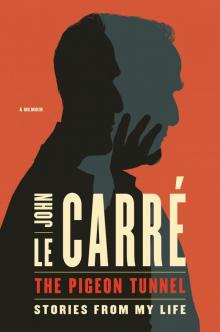 The Pigeon Tunnel: Stories From My Life
The Pigeon Tunnel: Stories From My Life Single & Single
Single & Single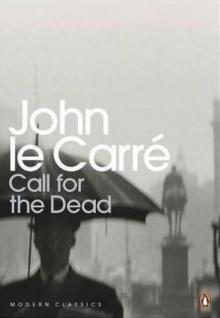 The Spy Who Came in From the Cold
The Spy Who Came in From the Cold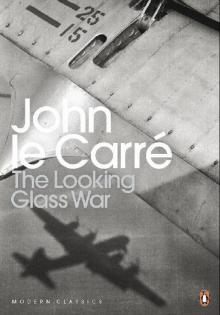 The Looking Glass War
The Looking Glass War The Night Manager
The Night Manager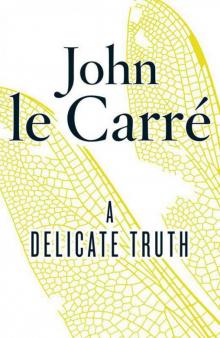 A Delicate Truth
A Delicate Truth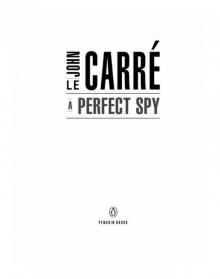 A Perfect Spy
A Perfect Spy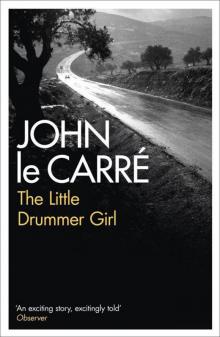 The Little Drummer Girl
The Little Drummer Girl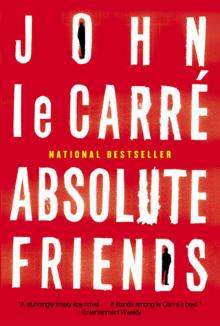 Absolute Friends
Absolute Friends A Murder of Quality AND Call for the Dead
A Murder of Quality AND Call for the Dead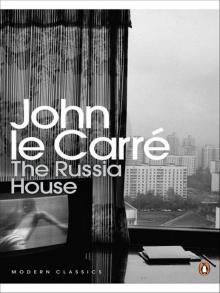 The Russia House
The Russia House The Tailor of Panama
The Tailor of Panama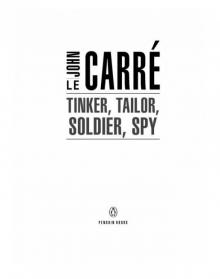 Tinker, Tailor, Soldier, Spy
Tinker, Tailor, Soldier, Spy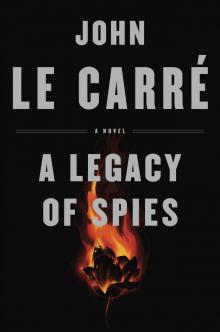 A Legacy of Spies
A Legacy of Spies The Mission Song
The Mission Song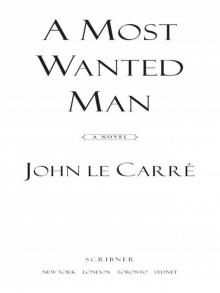 A Most Wanted Man
A Most Wanted Man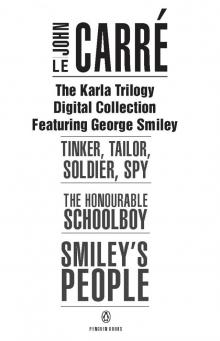 John Le Carré: Three Complete Novels
John Le Carré: Three Complete Novels The Secret Pilgrim
The Secret Pilgrim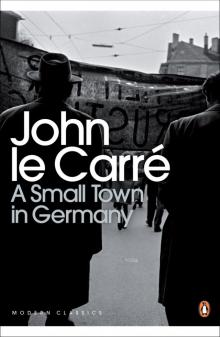 A Small Town in Germany
A Small Town in Germany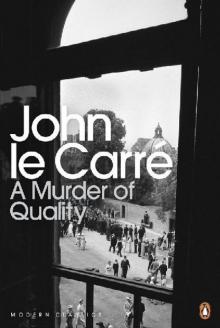 A Murder of Quality
A Murder of Quality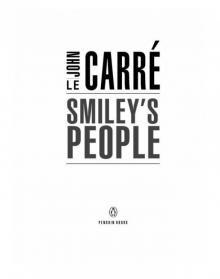 Smiley's People
Smiley's People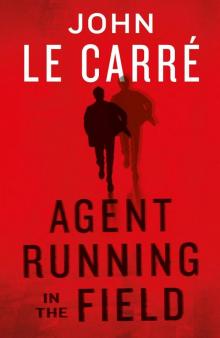 Agent Running in the Field
Agent Running in the Field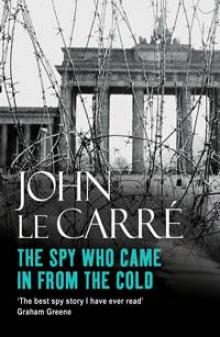 The Spy Who Came in from the Cold s-3
The Spy Who Came in from the Cold s-3 The Pigeon Tunnel
The Pigeon Tunnel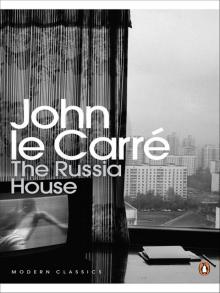 The Russia House - 13
The Russia House - 13 The Honourable Schoolboy
The Honourable Schoolboy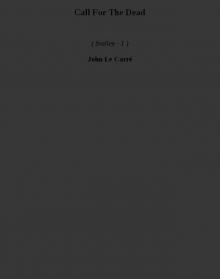 Call For The Dead s-1
Call For The Dead s-1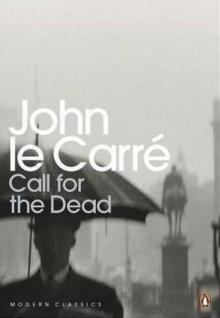 Call for the Dead
Call for the Dead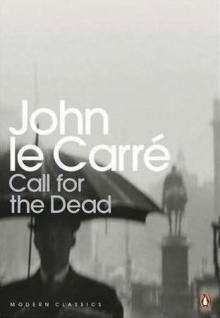 Call for the Dead - 1
Call for the Dead - 1